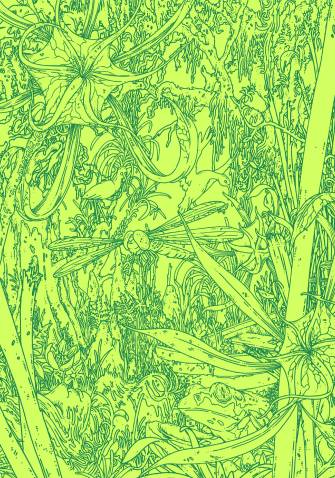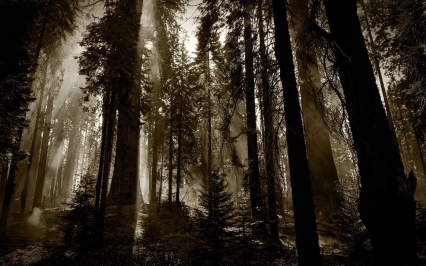
Annihilation is part science fiction, horror fiction, and fantasy fiction; three genres that create something more for readers to experience. Science fiction, many times, is a futuristic tale, or story that is technologically advanced, or even a story dealing with some kind of extraterrestrial. While horror fiction has elements that leave a reader scared, or uneasy. Then fantasy fiction deals with magic or the supernatural and many times isn’t set in the “real world.”
So far Annihilation is mostly a science/horror fiction novel. From the beginning, an air of uneasy mystery is brought to life. The Biologist says of Area X that “All of this part of the country has been abandoned for decades, for reasons that are not easy to relate” (3), which makes me wonder. Why is it not easy to relate? I feel that if something happens in an entire part of the country, as she says, that people would know what happened, or at least something easy to relate. On the same page the Biologist then says, “I do not believe that any of us could yet see the threat” (3).
The book continues in this way, making everything about Area X uneasy. This type of tension fits into the category of horror fiction, while the findings in the Tower lend itself to science fiction. The writing on the walls comprises of organisms that the Biologist can not fully identify. She says about the organisms in the letters, “most of these creatures were translucent and shaped like tiny hands embedded by the base of the palm” (24-25).

These elements create a mysterious, ominous feeling. This mystery and slight fear of what’s to come keeps people engaged and ready. In the first fifty pages only about a day and a half pass in the book but it reads quickly. Many things are being set up (what’s so important about the lighthouse?), and many things are happening (goodbye Linguist) but the pace doesn’t feel rushed. It’s almost like the untouched wilderness is growing around the reader without them realizing they’re being trapped.
This situation, a world that was never what it seemed, requires there to be something more. I think that to most people the world is just as it seems with the simplest explanation being the right explanation. People want to step into a world like the one Annihilation is creating, a world where the calm is not calm, and a tunnel is not a tunnel, but a tower.
The form of the text also adds to the expectations created by the genre, it also circumvents those expectations. The qualitative progressive form evokes a mood from inferred qualities and allows the reader to move into a certain headspace, and progress with the text’s mood (Kopp).

So far we have read that the Biologist in not just like her colleagues, she prefers solitude to people, and she not only fully accepts the dangers of the exhibition, she wants to be there. She wants to be there so much, even after three of her colleagues “leave” the exhibition she is still prepared to press on. Everyone else’s mood fits perfectly with the unease that surrounds Area X. The ominous nature of the uninhabited wilderness seeps into the others but not the Biologist.
I would argue that a qualitative progressive form surrounds the Biologist and her contamination. She says that her senses become heightened and that she is elated in the midst of the terrible things happening. On page 92 and 93 she worries herself out of this elevated mood with all of the questions about the Tower and the thing she names the Crawler, but finds that she slips back into it. She says that;
“The brightness in my chest, continued to sculpt me as I walked, and by the time I reached the deserted village that told me that I was halfway to the lighthouse, I believed I could have run a marathon” (93).
This statement comes after she has found a body, seen mysterious lights in a place no one should be and discovered some kind of creature. This circumvents the normal genre expectations. Under normal circumstances, I would expect the Biologist to be losing it, or making some crazy plan, or escaping. It’s unexpected to be that she’s feeling so good. But while I’m in this mood, or headspace, I am immediately thrust back into the ominous unease of the area. She continues to say that “I did not trust that feeling. I felt, in so many ways, that I was being lied to” (93).
Am I being lied to?

This change in mood makes me wonder where the story is going next. The genre would have me predict that either the Biologist is destroyed by Area X, or she somehow destroys Area X’s mystery or an entity inside of it. I’ll have to wait and see.

Excellent analysis of many of the recurring forma and themes throughout this book! One suggestion I would make is to focus a bit more attention on the recurring theme of the lighthouse, and how there always seems to be a desperate need to go there despite a lack of any guarantee of safety/shelter/etc. Lighthouses commonly represent lures towards safety and shelter, but considering the aura of the book, this lighthouse could easily prove to be a “false prophet” of sorts.It is so prominently displayed, and mentioned on the map as some sort of final destination, and maybe a sense of shelter from the madness of the island. However, my guess would be that this lighthouse simply serves as the final resting place for all the crews that came before our current crew, Erving as their final resting places as they lost their mind to despair.
LikeLike
Hi Nicole! I really enjoyed reading your blog, I especially like how you posed the question we have all been wondering: are we being lied to. I know you focused on the conventional and qualitative progressive form for your blog, so for my comment I decided to take on the syllogistic progressive form. Specifically in the way that the biologist steps up and takes over the role as a leader when the psychologist disappears. This is something that we, as a member of our culture, would expect someone to do in this situation. But we see in the text, that it is hinted at along the way. It is somehow inferred that the biologist would be the one to take control. For one, she is the member who has become contaminated thus unaffected by the hypnosis. She also is described as being distant and one to want to take control. This logical progression comes to a head at the moment that the anthropologist’s body is found in the tower and the psychologist is nowhere to be found. I also found the part when the biologist makes an unsuccessful attempt to hypnotize the surveyor very telling of her character.
LikeLike
Nice job Nicole!
As you know, repetitive form “is the consistent maintaining of a principle under new guises.”
One of the many things repeated in Annihilation is the tunnel or tower.
Just the fact that the structure is mentioned through different terms -Tunnel or tower- shows that it has different guises.
The Biologist sees it as a tower, while the rest of the group says it is a tunnel. I think that this re-indicates the fact that the Biologist stands out from the rest of the group. She think s differently.
Maybe the rest of the group is meant to believe that the structure is a tunnel because they are hypnotized like so, while the Biologist, who is not hypnotized (anymore), can see it as a tower.
-Alex
LikeLike
While you do a great job here explaining exactly why Annihilation fits into the narratives of science fiction and horror so well, providing plenty of detail and evidence I believe you make the mistake as viewing mystery as more of a subset of these genres, rather than as a genre itself. Consider again what it really is that makes you, as the reader, want to keep turning the pages. Is it for the horrific scenery? Is it to delve just a bit deeper into the development of these characters? Or, rather, is it because of the mystery that permeates the entire narrative? It seems to me that this book is about questions and mysteries more than anything else, and sadly many of the questions are left open to interpretation, or fortunately, depending on how you look at it. For me at least, what kept me turning the pages was wanting to finally find out the mystery behind Area X, and all that it entails, along with the true motives behind the characters, and the clandestine government that sent them on a voyage that can and should be looked at as a suicide mission.
LikeLike